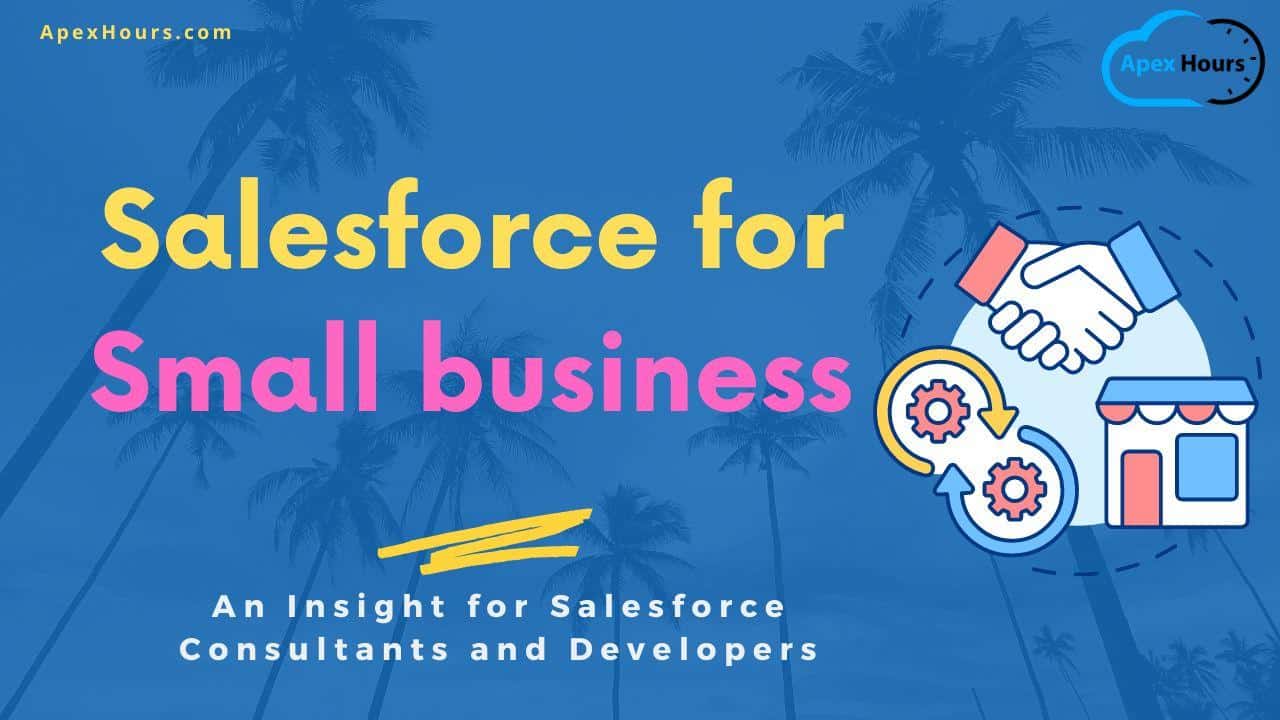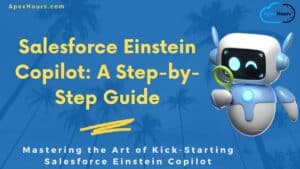The Salesforce consulting industry has been an exciting ride for me. Over the last four years, I have scaled the ranks, beginning as a junior consultant and gradually ascending to a senior position. It’s a journey that has provided me with priceless insights and invaluable experiences which I am thrilled to share. Join me to learn about Salesforce for Small business.
Writing this article was a decision driven by two key factors. Firstly, this platform, a vibrant community bustling with the exchange of ideas, provided the ideal space to broadcast my experiences. With Amit, the owner of this blog, also sharing this vision, it made perfect sense. Secondly, this journey has filled me with a wealth of knowledge and insight that I feel compelled to share with others, so you too can benefit from my experiences. Especially if you’re a fresher in the Salesforce ecosystem trying to get your first job, this may give you an extra tip on where to start your career.
What is a Small Company?
Before delving deeper into my experiences, it is crucial to outline the definition of ‘small companies’. At least how I see it. To me, small companies refer to those with a workforce ranging from 50 to 200 employees. These are organizations where various departments consist of 3 to 5 people sharing similar roles. This could mean a sales team of 5 representatives, or a customer service team of 4 agents.
Benefits of working with Small Companies
As we delve deeper into the landscape of Salesforce consulting within the realm of small businesses, it’s essential to fully comprehend the distinctive advantages that this market segment offers.
Not only do these benefits contribute to professional growth, but they also enrich the overall consulting experience, infusing it with fresh perspectives and diverse challenges. In this section, I’ll unpack the three key benefits of working with small businesses: Owner Involvement, Varied Portfolio, and Risk Diversification.
These cornerstones not only pave the way for a rewarding consulting career, but also ensure resilience and stability in a fast-paced and competitive industry. But let’s deep dive into each of these.
Owner Involvement
Working with small businesses often provides a unique opportunity to collaborate closely with the owners. Unlike larger corporations where decisions are often made by a board or an executive team, in small businesses, the owners are often deeply involved in every aspect of their business. Your proposals, solutions, and strategies are assessed and appreciated by those with the highest stakes in the business. They understand the implications of your work and recognize its value more intimately, as it directly impacts their bottom line.
Moreover, these owners are typically more than just business leaders; they are visionaries who are passionately invested in their businesses. This genuine interest translates into a more engaging and cooperative work environment. You’re not just a consultant; you become a trusted partner who contributes to the realization of their vision. This sense of direct impact and contribution can be incredibly fulfilling.
Varied Portfolio
Another benefit of working with small businesses is the opportunity to build a varied portfolio. As a consultant, you’re not tied down to one client or project, but rather, you engage with multiple clients across different industries. This variety keeps the work exciting and dynamic, continually presenting new challenges and learning opportunities.
Additionally, this variety means constant stimulation and less monotony. You can switch between projects, applying what you’ve learned from one to another. With every completed project or achieved milestone, there is a tangible sense of accomplishment. Each success, each victory, belongs not just to the client but to you as well. The joy of seeing a business thrive thanks to your efforts is a reward in and of itself.
Risk Diversification
Risk diversification is a key advantage of working with multiple small businesses. As a consultant, if you’re working with just one or two large clients, the loss of any of these clients could be a significant blow to your income. However, when your client base consists of multiple small businesses, the risk is spread out. Even if one client relationship ends, the impact on your overall business is much less drastic.
Moreover, diversification goes beyond just reducing financial risk. It also means you’re not dependent on the business cycles or financial health of a single client or industry. You’ll be exposed to different business models, industry trends, and challenges, which ultimately strengthens your skills as a Salesforce consultant.
In conclusion, the small business market offers several unique advantages for Salesforce consultants. The high degree of owner involvement, the opportunity to maintain a varied portfolio, and the ability to diversify risk make it an attractive prospect.
Challenges of Working with Small Companies
Just as there are distinct benefits to working with small businesses, there are unique challenges as well. These challenges can test your professional skills and patience, but they also provide valuable opportunities for growth and learning.
Extremes in Project Expectations
Working with small businesses as a Salesforce consultant often presents an interesting dichotomy in project expectations. On one hand, you may encounter clients with limited resources who nevertheless envision a comprehensive and technologically advanced solution. This often pushes your technical acumen to its limits, demanding creative problem-solving to deliver robust, sophisticated solutions on a shoestring budget.
Conversely, some projects may be relatively straightforward, requiring no intricate customization or advanced feature implementation. In such scenarios, your role becomes that of an educator rather than a developer, with the task of guiding the client through Salesforce functionalities and advising them on best practices. This dual role can be both challenging and rewarding, enhancing your adaptability and expertise.
Reluctance in Product Ownership
A common challenge when working with small businesses is the owners’ reluctance to take ownership of their Salesforce solution. They often delegate this responsibility to you, the consultant, expecting you to take the reins of product ownership.
This situation can present complications, especially as the project nears completion and sign-off. It’s crucial to remember that, as a consultant, you are there to guide, advise, and implement, but not to assume total control over their product. Striking a balance between support and over-involvement is vital to maintaining a healthy and productive professional relationship.
Limited Tech Knowledge and High Expectations
In many cases, small business owners may lack the technical expertise to fully understand the intricacies of Salesforce implementation. Despite this, they may have high expectations for what can be achieved with their budget.
This mismatch can lead to misunderstandings and strained relationships, as they might anticipate extensive, thoroughly tested processes within the scope of a minimal budget. As a consultant, clear communication and expectation management are essential in such situations.
Contracts: A Legal Framework Rather than Binding Agreement
Another challenge is that smaller companies may view contracts more as loose guidelines for the professional relationship, rather than binding agreements.
This approach can lead to ambiguity, making it harder to enforce terms and manage expectations effectively. Clear, explicit contracts and open dialogue about their significance are essential to prevent misinterpretations and disputes down the line.
Disrespect of Personal Time
Finally, one of the more common challenges is the encroachment on personal time. Small business owners often see consultants more as partners rather than service providers, leading them to overstep boundaries by contacting you outside of agreed working hours.
This issue can be addressed by setting clear boundaries and communication norms at the start of your relationship. Reminding them that, while you are committed to their project, you also require time to recharge and attend to other obligations is vital to maintaining a sustainable and respectful professional relationship. Easier to say than do…
Salesforce edition
Working with small businesses often involves dealing with the complexities and limitations of Salesforce’s Professional Edition. This edition, commonly utilized by smaller organizations due to its affordability and fit for their needs, comes with certain constraints that can impact the delivery of a robust, tailor-made solution. One such limitation that can be particularly challenging is the lack of API support. This restriction can obstruct seamless integration with certain AppExchange applications, forcing you, as a consultant, to be creative and innovative in finding workaround solutions.
Flow limitations also present a unique challenge. In the Professional Edition, Salesforce limits the number of flows per type to five. This might seem adequate for basic processes, but if the client’s requirements involve more intricate process automation or complex workflows, you can quickly hit the wall. Additionally, this edition only allows three record types per object. If the project calls for a high level of customization, this can significantly limit your ability to deliver a complex, nuanced solution.
Consequently, as a consultant, you may often find yourself in a position where you need to convince the client to upgrade to a higher Salesforce edition. This is easier said than done, as most small businesses operate on limited budgets and may be reluctant to invest more. Therefore, it’s crucial to be prepared to articulate clearly how an upgrade can significantly enhance their operational efficiency and offer long-term cost benefits. This part of the job requires not only technical expertise but also proficient communication and persuasion skills.
Final word
In conclusion, a heartfelt thanks to Amit for providing this platform to share my insights. The journey of consulting for small businesses is laden with unique challenges and rewards. Yet, it’s essential to remember that your personal attributes will play a significant role in successfully navigating this landscape. Setting clear boundaries and maintaining a balanced relationship with your clients can lead to a fulfilling and impactful experience.
Personally, I’ve always found myself more drawn to smaller projects than corporate ones. They offer a deeper connection with reality and a more tangible impact on businesses and the individuals involved. Every solution implemented, every process streamlined, and every inefficiency addressed translates directly into business growth and success. There’s something profoundly satisfying about witnessing the fruits of your labor fostering positive change and progress.
If you’re a small business owner reading this and wondering how to leverage Salesforce to your advantage or if Salesforce is even worth it for small business, I encourage you to read this article of my colleague. Our team understands the intricacies of small businesses, and we have the experience, expertise, and empathy to guide your Salesforce journey effectively. We’re committed to helping your business not just survive, but thrive, in this ever-evolving digital landscape. Don’t hesitate, get in touch with us today, and let’s explore how we can fuel your business’s growth together.




